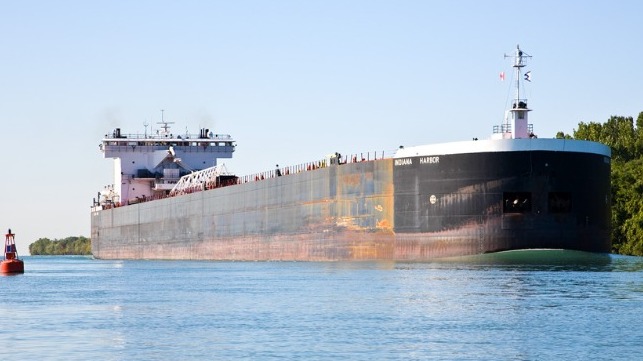Op-Ed: Bareboat Charter Scheme Threatens Great Lakes Shipping

A major private equity firm and one of its holdings could force a major U.S.-flagged fleet of Great Lakes dry bulk cargo vessels out of service — and the risk these businesses raise could spread to the U.S.-flagged deep-sea and inland waters maritime sectors.
The culprits here are American Industrial Partners and the bankrupt Rand Logistics LLC. Their intent is to gut jobs, wages and employee benefits to secure ‘cost savings’ that can then be diverted to paying off the massive accumulating debt of Rand Logistics and widening the profit margin of American Industrial Partners.
American Industrial Partners in 2017 acquired Rand Logistics LLC, a Great Lakes shipping interest with two subsidiaries at the time — Lower Lakes Towing LLC under the Canadian flag and Grand River Navigation, a U.S.-flagged tug-barge fleet operating on the Lakes.
In May 2020, Rand Logistics LLC — guided by American Industrial Partners — purchased the consistently profitable American Steamship Co. fleet of Great Lakes bulk carriers from GATX Railroad. American Maritime Officers has a collective bargaining agreement with American Steamship Co.
American Steamship Co. today is struggling to complete the bareboat charter of five of its vessels to Grand River Navigation, which has a labor agreement with the International Organization of Masters, Mates and Pilots. This corporate relationship threatens the stability of every U.S.-flagged bulk cargo fleet on the Lakes and puts the jobs of skilled, experienced seagoing professionals in these fleets at real risk. The sinking of American Steamship Co. — which has operated successfully on the Great Lakes since 1904 — is only the beginning.
On May 14, 2020, Rand Logistics LLC and Ally Bank of Utah signed a mortgage agreement providing Rand Logistics up to $370 million in new loans and other “financial arrangements.” American Steamship Co. was forced to put nine of its 12 debt-free vessels up as collateral in this transaction, including four of the vessels bareboat chartered to Grand River Navigation. If Rand’s poor credit tradition prevails here, the American Steamship Co. fleet will be sold for the exclusive benefit of Rand Logistics and American Industrial Partners.
The potential consequences along the way to American Steamship Co.’s fast fade from Great Lakes service include a rate war, in which long-established Great Lakes bulk fleets will have to diminish labor standards and pare wages and benefits to compete and survive. As fleets go under, powerful business and political interests will demand waiver or exemption from the venerable Jones Act to fill service gaps — foreign-flagged ships will be delivering iron ore, limestone and coal to Midwest steel, automotive and energy industries. This will inspire calls for comparable Jones Act concessions in East, Gulf and West Coast and inland markets and even the outright repeal of this domestic shipping law.
Grand River Navigation officers from the company’s tug-barge fleet are displacing the engineers and mates aboard the five American Steamship Co. vessels shifting to Grand River, despite the Grand River officers’ insufficient number, professional inexperience with the larger, much more powerful American Steamship tonnage and anonymous reports from Great Lakes mariners alleging incompetence among the Grand River Navigation vessel complements.
There is a lock-sized gap between the vessel officer wages, benefit funds and quality of work and life concerns in American Steamship Co. compared to the compensation and levels of decency and respect apparent in Grand River Navigation.
American Industrial Partners could create the same chaos in the U.S.-flagged oceangoing and inland fleets. AIP has also acquired SEACOR Holdings Inc., which owns fleets of U.S.-flagged tankers and tugs under various subsidiaries, including Seabulk Tankers Inc., Seabulk Towing Inc. and the former Waterman Steamship Co.

that matters most
Get the latest maritime news delivered to your inbox daily.
Paul Doell is the National President of the American Maritime Officers.
The opinions expressed herein are the author's and not necessarily those of The Maritime Executive.
